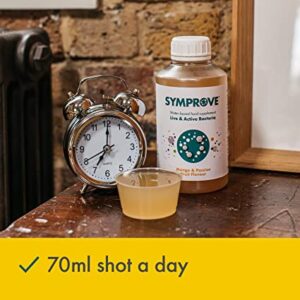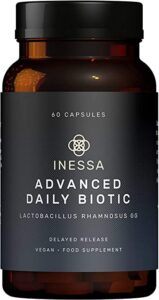The world of probiotics is growing at a rapid pace. There is a lot of research being carried out on this topic and new studies are emerging all the time about how probiotics are helping various diseases, illnesses, symptoms and more.
To most people, probiotics are not much more than a gimmick, a new fad and a bunch of bacteria with really long names and huge numbers associated with them. I wanted to get to the bottom of what the scientific research was actually telling us about them and simplify all the information to make it more easy to follow. Most of our readers are either pregnant or have had a baby recently or within the last few years and spend most of their time tired, low on spare time and with a bit of brain fog, so I’m hoping this will make things a little clearer.
What are probiotics (in simple terms)?
Probiotics are living organisms that are found naturally in foods such as yogurt, kimchi, sauerkraut and kefir. These bacteria are then grown in large quantities in a laboratory setting and put into a more concentrated product like a tablet or drink. They are known as ‘good’ or ‘friendly’ bacteria as they are thought to help to restore the natural balance of bacteria in your gut when it’s been disrupted by an illness or treatment.
What is the difference in a prebiotic, a probiotic and symbiotic?
Most people have heard these names bandied around over the last few years but how many people actually know the difference in them? (It is certainly not made clear in the media).
Probiotics are live microorganisms that you add to your body to improve the amount and diversity of bacteria in your digestive system. They are usually taken to improve symptoms associated with certain illnesses such as IBS and eczema.
Prebiotics are a type of indigestible fibre that the bacteria in the gut can ‘feed’ on. These are more of a ‘one size fits all’ option. If you don’t have a specific illness that you’re are trying to treat then prebiotics are a good option as they help to enhance the bacteria that you already have in your gut. This can help boost your immune system, in theory, helping to reduce the amount of illnesses you catch or the time in which you ‘suffer’ with that illness – i.e. the common cold.
Synbiotics are combinations of prebiotics and probiotics and are thought to help each other out. While this sounds like the best option, there hasn’t been as much research into the synbiotics and they are more poorly understood.
Why should you take probiotics? What are the intended benefits?
Firstly, there’s the obvious, to help with gut health, but what does the research tell us?
In 2013, the European Society for Primary Care Gastroenterology (ESPCG) published an evidence‐based international guide for the use of probiotics in the management of specific lower gastrointestinal (GI) symptoms. This guide was based on the results of a systematic review of evidence regarding the use of probiotics vs placebo in randomised controlled trials (RCTs). Recent systematic reviews have helped to guide treatment further. This study from 2018 concluded that there was really strong evidence available in support of probiotics for treatment of;
- Overall symptoms and abdominal pain in IBS
- Prevention or reduction of diarrhoea in patients receiving antibiotics
- Prevention or reduction of diarrhoea in patients receiving Helicobacter pylori eradication therapy
And there was moderate evidence also supporting the use of probiotics for;
- Bowel movements and bloating/distension in IBS
Secondly, recovery from illness might be quicker:
There has been quite a bit of research more recently looking at the role of probiotics in helping recovery from short illnesses like the common cold.
This study from 2015 looked at the effect of three probiotic bacteria on academically stressed undergraduate students. They reported that daily intake of a specific probiotic provided benefit related to cold/flu outcomes during their acute stress.
This study looked at whether probiotics could help to prevent catching a cold in the first place. Sadly, they only reported a marginal effect of probiotics on the prevention of the common cold.

Thirdly, it might help to regulate cholesterol levels:
This is a topic that has been researched in a little more detail recently.
Unfortunately, this study didn’t find any significant results when looking at the role of probiotics in control of cholesterol levels.
However, this slightly more recent study, reported some good effects from using probiotics in the treatment of cholesterol issues but stated that the results might have been even better had they used probiotics in tablet form.
Fourthly, if you have endometriosis, probiotics might help your symptoms:
Although this study is a little old (2011), they produced some interesting results. They looked at the probiotic called Lactobacillus gasseri OLL2809 and its effects on menstrual pain and dysmenorrhea in endometriosis patients. It was found that taking that probiotic in tablet form was effective in treating these symptoms and produced no adverse effects.
This systematic review, which was published in 2022 found that taking a combination of a multivitamin/mineral, a Lactobacillus/Bifidobacterium probiotic and fish oil, for six months was more effective than placebo for endometriosis symptoms.

Fifth in our line-up; gestational diabetes:
This Cochrane review looked at ‘Probiotic treatment for women with gestational diabetes’. They found that there was quite strong evidence of a reduction in infant hyperbilirubinaemia (jaundice) with probiotics compared with placebo but little change with blood glucose levels unfortunately. The other positive outcome was that there were no adverse effects reported in any of the studies and the use of probiotics in pregnancy was deemed as safe (we’ll look at the safety of probiotics in pregnancy in a little more detail further down).
This cochrane review from 2020 looked at whether probiotics could play a part in preventing women from developing gestational diabetes in the first place. They reported that the evidence currently available, is of low quality and therefore cannot be used as guidance for this as a treatment option.
Sixth we have the potential effects of probiotics on mastitis:
We didn’t find a lot of research on this topic but this study, published in 2020, reported that Probiotics appeared to reduce the risk of mastitis more than a placebo. They couldn’t conclude on the risk of breast pain or nipple damage reduction using probiotics because the certainty of evidence was too low.

Seventh, improvement in babies health outcomes:
This large scale meta-analysis of randomised controlled trials looked at the effects of probiotics in pregnant women. They looked at results from a total of 4356 pregnant women and concluded that probiotics had a positive effect on:
- Atopic eczema
- Eczema
- Gestational age (pre-term births)
- Infant mortality rates
- Necrosting enterocolitis (intestinal disease)
The World Allergy Organization (WAO) published guidelines in 2015, for Allergic Disease prevention and specified that they do not support the use of probiotics for primary prevention of allergic disease, but do favour probiotic supplementation in pregnant/lactating women and in infants with a family history of allergic disease.

Eighth; for treatment and or prevention of bacterial vaginosis (BV):
This study looked at the gut bacteria in pregnant women with BV and pregnant women without BV and concluded that probiotics might be able to influence their recovery.
This study from 2014 looked at whether probiotics could help women who suffered with recurring BV infections. They found that probiotics were a possibility for treatment and also a safe option. This study was not carried out on pregnant women however.
Ninth; probiotics for weight loss:
Probiotics appear to influence appetite to help aid weight loss. Some studies have shown that specific bacteria can inhibit the absorption of fat. It is also thought that probiotics may help to reduce systemic inflammation which can protect against obesity. This systematic review looked at the effects of probiotics on body weight, body mass index, fat mass and fat percentage in subjects who were overweight or diagnosed with obesity. They found some promising results (although small). Although there have been some promising results in this field of study, it is not yet conclusive as sample sizes have often been quite small so evidence levels remain low.
Last-up (and it’s a biggie), postnatal depression and anxiety, can probiotics really influence this?
We found a lot of papers that have researched this subject and most actually showed some promising results.
According to this study from 2017, probiotics can play a major role in reducing postnatal depression and anxiety. They looked specifically at the role of Lactobacillus rhamnosus HN001 on Postpartum Symptoms. The study was A Randomised, Double-blind, Placebo-controlled Trial, but it must be noted that it was funded by the manufacturer (so keep that in mind). They concluded that the women who received the HN001 had significantly lower depression and anxiety scores in their postpartum period.
We also came across this study from 2016 which is a systematic review looking into the role of probiotics in depression (in general). They found that probiotics were associated with a significant reduction in depression in the under 60’s. This study looked at overweight and obese women in pregnancy to see if probiotics could help with pre and / or postnatal depression and anxiety. They too, shared some promising results.
One final study worth mentioning is this one from 2021. This systematic review reported limited but promising evidence about the effectiveness of probiotics during pregnancy to reduce anxiety symptoms and reduce the proportion of women scoring ABOVE a cut-off depression score.

So, what does the research say about the safety of probiotics in pregnancy?
This is the largest and most up to date study that we came across (2021). These researchers carried out a Systematic Review and Meta-Analysis evaluating the evidence available on adverse effects of maternal probiotic, prebiotic, and/or synbiotic supplementation during pregnancy and lactation. They concluded that probiotic and prebiotic products are safe for use during pregnancy and lactation and do not pose any serious health concerns to mother or infant.
Here is an example of another study that reported on the safety of probiotics during pregnancy with really good results.
Although the literature is showing promising results when it comes to the safety of probiotics, always bear in mind that probiotics are classed as food supplements and not medications and are therefore not subjected to the same rigorous testing procedures that medicines are. Patients should always read labels closely and use commercial probiotics with caution. It is also not recommended that people with a compromised immune system use probiotics.

What are the different types of probiotics and how do you pick the right one for your symptoms?
There are many, many different types of probiotics, listing them all here is not going to be helpful to anyone. The main thing that you need to know is that different probiotics do different things. For example, if you have IBS but take a probiotic that helps bacterial vaginosis, it won’t work (and visa-versa, but there is often a cross over with some bacteria).
Lactobacillus and bifidobacteria are two of the most common types of probiotics on the market and you see these names banded about quite a lot. Annoyingly, there are also many different strains of these bacteria to look out for (but these, amongst a few others do have the most research behind them). To be a true probiotic, a product must contain live and active bacterial cultures, and it should indicate as much on its packaging. A general recommendation is to choose probiotic products with at least 1 billion colony forming units (CFU).
A simple way to approach all of this is to:
- Buy from a brand that you know and trust and check that those probiotics mention the bacteria that you want to add to your digestive system.
- One thing to watch for is the wording on the packaging. In Europe, probiotics are considered food supplements and such products cannot be labelled as ‘probiotics’ at present (this law is constantly under review), they can also not state that they have specific health benefits (like medication can).
- So if a label states that they are ‘probiotics’ and they help relieve IBS (for example) then they are either not following EU laws and therefore unsafe to take or they are made outside the EU and come under different laws of manufacture.
- For example, the ‘Probiotics’ sold by Holland and Barrett (a well known company manufacturing in Amsterdam) are called ‘Live Friendly Bacteria’. They still contain the probiotic bacteria needed to help with specific health conditions but they are following the EU laws.
Here’s how to find the right bacteria for your needs;
In some of the studies quoted previously, you will see the bacteria that has been investigated usually has 3 parts to its name (it’s genus, species and strain), i.e; Lactobacillus rhamnosus HN001
- Genus = Lactobacillus
- Species = rhamnosus
- Strain = HN001
You need all 3 parts of the name to find the correct probiotic for you.
The effects of probiotics on IBS have been researched quite thoroughly with positive results. The probiotics that have proven to be helpful include (but are not limited to); Bifidobacterium bifidum MIMBb75, Lactobacillus plantarum 299v (DSM9843) and Escherichia coli DSM17252. So this is what you need to be looking for on the probiotic packaging.
If you want to treat an episode of diarrhoea associated with taking antibiotics then it is recommended that you include the following probiotics (amongst others); Yogurt with Lactobacillus casei DN114, L. bulgaricus, Streptococcus thermophilus and Lactobacillus acidophilus CL1285 and L. casei (Bio-K+ CL1285).
As you can see, these bacteria choices are pretty different!
So lets make this even easier:
One of the best places to go to find which strains help which conditions is The World gastroenterology website and have a look at their Organisation Global Guidelines for probiotics.
If you look towards the bottom of these guidelines they have summarised all of the research under each condition and which probiotics have been found to be beneficial and whether the research supporting it is strong or weak.
Another great resource for looking up the right probiotics for you is this study from 2018 which lists which probiotics help which symptoms and which studies support those claims.
Are probiotic supplements better than taking naturally occurring probiotics in foods?
Fermented foods like yogurt, kefir, kombucha (fermented black tea), sauerkraut, kimchi and tempeh and miso (fermented soybeans), provide some of the probiotics needed for a ‘healthy gut’. These foods might have beneficial effects on your immunity, inflammation and cholesterol levels which means they are a great, regular addition to your diet if you are looking for more generalised health benefits. If you are looking to help specific symptoms or a certain disease, then supplements might be a little more specific and tailored to your needs.
Which are the best probiotics to take?
Once the specific probiotic strain (or mixture of strains) is selected for the disease or symptoms being treated, the next challenge is finding a product containing those specific strains, which is of reliable quality.
Probiotics are also available in a wide range of formulations (from yogurts to fermented beverages, to powders in sachets or capsules or tablets). There is scant evidence comparing which type of formulation may be more effective than another. It is often down to how the bacteria survive in different environments and how well people tolerate certain products (ie dairy).
Is it not just easier to take a probiotic with loads of bacteria in?
Not necessarily. If you feel you have a healthy ‘gut’ but have one issue that you want to solve (like eczema) then you might be better off taking the specific bacteria for your symptoms (and maybe a prebiotic as well to enhance what you already have). There is some research that suggests that taking lots of bacteria at the same time can affect the overall results of some of the strains and maybe your own healthy bacteria. There are also studies that back the use of probiotics containing multiple strains, so it seems that more research in this area is needed.
Here are our top probiotics based on the bacteria contained within them:
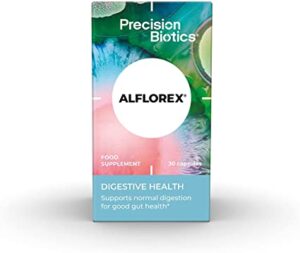 Name: Alflorex
Name: Alflorex
Manufacturer: PrecisionBiotics
Headquarters: Ireland
Most researched Probiotics contained: Bifidobacterium infantis (B. infantis) 35624.
What it’s best for: IBS symptoms, ulcerative colitis, chronic fatigue syndrome and psoriasis.
Pros: The Probiotic strain scientifically known as Bifidobacterium infantis (B. infantis) 35624 is the only product in the UK and Ireland that contains this strain (at the time of manufacturing). It is dairy free, gluten free, soya free, sugar free, suitable for vegetarians and those on a low FODMAP diet. It is specific to IBS symptoms but there have been some links also to conditions such as ulcerative colitis, chronic fatigue syndrome and psoriasis.
Cons: States that it is dairy free but not vegan friendly. Doesn’t state that it is plastic free or recyclable. Very specific targeting (so you need to be sure of your diagnosis).
Research behind it’s use? Yes (and have a read of this one also).
Where can I buy it? HERE
Manufacturer: Symprove Ltd.
Headquarters: UK
Most researched Probiotics contained: Lactobacillus rhamnosus, Lactobacillus plantarum and Lactobacillus acidophilus.
What these bacteria are best for: IBS, Crohns disease, ulcerative colitis and some symptoms associated with endometriosis. Also links with improving digesting and increasing immunity and preventing vaginal infections.
Pros: Made in the UK. It is vegetarian, gluten free and vegan. It is liquid form as opposed to tablet (good if you don’t like taking tablets). It contains a mixture of bacteria including: Lactobacillus rhamnosus, Lactobacillus plantarum, Lactobacillus acidophilus and Enterococcus faecium. These bacteria are what should be found in a healthy gut but are often missing or of low quantity in IBS patients. The manufacturers claim it works better than other brands because the bacteria survive all the way to the gut, where they can then thrive. Another Pro for symprove is that they use an independent company to do their testing.
Cons: It comes with a rather hefty price tag compared to other ‘probiotics’. This company only set up in 2002, so it’s not one of the oldest and most well known (like some of the others).
Research behind it’s use? Yes (1) and (2)
Where can I buy it? Here
Name: Inessa Advanced Daily Biotic
Manufacturer: Inessa
Headquarters: London
Most researched Probiotics contained: Lactobacillus Rhamnosus GG
What these bacteria are best for: Diarrhoea from taking anti-biotics or irritable bowel with diarrhoea as the main symptom, helping to prevent recurrent UTI’s and support general gut health.
Pros: This product is vegan friendly and made using the best selling probiotic in the USA. This strain has had quite a lot of research behind it’s use. It claims to provide a clinically relevant dose (meaning the dosage has been researched and it’s not just a wild guess like some others). As well as helping with diarrhoea (and IBD), it is also good for helping to support good digestion and immune health and restoring balance in your digestive tract.
Cons: Not one of the most well known companies in the UK. Only founded in 2016.
Research behind it’s use? Yes, quite a lot! Have a look at this study and this study.
Where can I buy it? Here
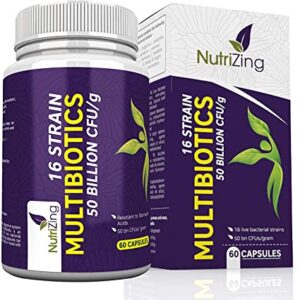 Name: Multibiotics
Name: Multibiotics
Manufacturer: Nutrizing
Headquarters: London
Most researched Probiotics contained: Bifidobacterium Bifidum, B. infantis, Lactobacillus Acidophilus, L. Reuteri, L. Rhamnosus, Lactobacillus Plantarum.
What these bacteria are best for: Constipation, IBS (which has constipation as the main symptom), reduce gas (flatulence), bloating.
Pros: Contains Bifidobacterium and Lactobacillus strains which have been studied a lot and proved affective in treating constipation. Contains other bacteria also that can help other symptoms related to the gut (including IBS and IBC). won the best gut and supplement award at the Beauty Shortlist & Wellbeing Awards, March 2020.
Cons: The company was founded in 2014, so still quite new to the industry. The tablets come in a plastic bottle.
Research behind it’s use? Yes, have a read HERE, HERE and HERE.
Where can I buy it? Here
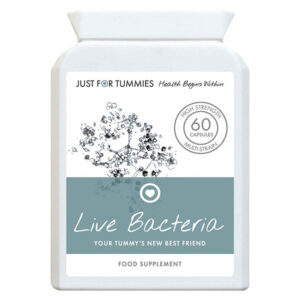 Name: Just for tummies Live Bacteria Capsules.
Name: Just for tummies Live Bacteria Capsules.
Manufacturer: Nottingham Health Shop Limited.
Headquarters: UK
Most researched Probiotics contained: lactobacillus rhamnosus, lactobacillus acidophilus, lactobacillus casei, bifidobacterium breve.
What these bacteria are best for: Constipation, IBS symptoms, inflammatory bowel disease, Crohns, allergies, skin conditions.
Pros: Made in the UK, vegan, gluten-free and absolutely NO artificial fillers, binders or bulking agents.
Cons: You are guided to take 2 tablets a day (makes them a little more costly and easier to forget to take).
Research behind it’s use? Have a read here.
Where can I buy it? HERE
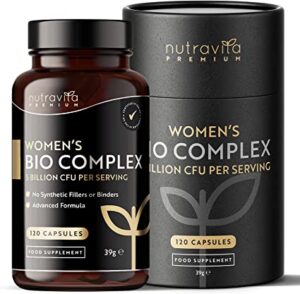 Name: Women’s Bio complex
Name: Women’s Bio complex
Manufacturer: Nutravita
Headquarters: Maidenhead, UK
Most researched Probiotics contained: Lactobacillus rhamnosus–LRa05, Lactobacillus reuteri–LR08, Lactobacillus gasseri–LG08, Lactobacillus plantarum–LP90, Lactobacillus acidophilus–LA85.
What these bacteria are best for: Period pain, dysmenorrhoea, endometriosis (where the main symptoms are period-related), bacterial vaginosis, ulcerative colitis, IBS and stomach ulcers.
Pros: Packaging is 100% recyclable. The capsules are vegan friendly. One of the key bacteria is Lactobacillus gasseri–LG08 as this has some good research backing it’s use in dysmenorrhoea and period pains. It has also been linked with prevention of bacterial vaginosis and stomach ulcers, helping symptoms associated with ulcerative colitis, IBS and endometriosis.
Cons: It’s hard to find much wrong with these capsules, we really loved everything about this company. The only thing we should mention is the fact that the company is just 6 years old (relatively new).
Research behind it’s use? Great article to read about the bacteria here and there is a study here.
Where can I buy it? Here
 Name: Advanced Multi-strain Formulation
Name: Advanced Multi-strain Formulation
Manufacturer: Bio-Kult
Headquarters: USA but UK factories (following EU regs).
Most researched Probiotics contained: Bifidobacterium bifidum, Bifidobacterium breve, Bifidobacterium infantis, Bifidobacterium longum, Lactobacillus acidophilus, Lactobacillus plantarum, Lactobacillus rhamnosus, Lactobacillus salivarius.
What these bacteria are best for: IBS symptoms (especially those with diarrhoea as the main symptom), travellers diarrhoea, diarrhoea associated with antibiotics, general gut health and weight-loss (maybe – results on this have been a little hit and miss but are promising).
Pros: Well known and trusted brand (been going a long time). Their products undergo third-party testing to guarantee stability and bacterial count for up to 2 years. They are good for ‘all-round’ gut health as they contain 14 different strains of bacteria. They do state that they are suitable for children and pregnant ladies but to always check with a health professional first.
Cons: Not suitable for Vegans or anyone with a dairy intolerance / allergy (contains milk), a lot of their packaging isn’t recyclable.
Research behind it’s use? Have a look at this study (bear in mind that this was funded by the manufacturers though). Here is another study which is worth a read. This study looked into some of the strains contained in the bio-kult probiotic for weight loss.
Where can I buy it? Here
 Name: Renew life florabiotic everyday.
Name: Renew life florabiotic everyday.
Manufacturer: Renew life
Headquarters: USA
Most researched probiotics contained: Bifidobacterium lactis (3 strains), Lactobacillus plantarum, Lactobacillus rhamnosus, Lactobacillus acidophilus (2 strains), Bifidobacterium infantis, Lactococcus lactis, Lactobacillus casei, Lactobacillus paracasei, Lactobacillus brevis.
What these bacteria are best for: Enhancing mood, anxiety, IBS symptoms, general gut health and reducing cholesterol.
Pros: Packaging is recyclable. The company have been around a number of years. Very large mix of bacteria included. Contains some of the most thoroughly researched bacteria strains.
Cons: Not vegan friendly. Not targeted to a specific condition, is a little more general (which is also great if that’s what you are after).
Research behind it’s use? Yes, have a read of these mood related studies here, This is also a great article regarding the effects of probiotics on mood. This study has positive results regarding the effects on cholesterol.
Where can I buy it? Here









